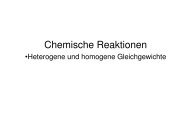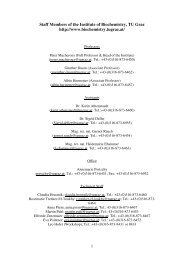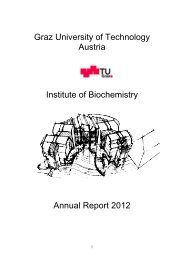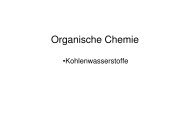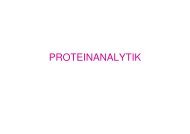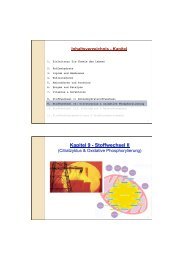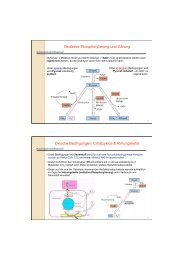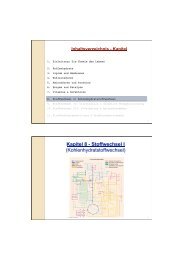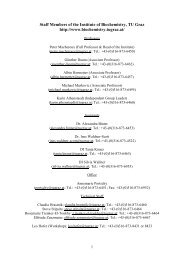Graz University of Technology Austria Institute of Biochemistry ...
Graz University of Technology Austria Institute of Biochemistry ...
Graz University of Technology Austria Institute of Biochemistry ...
Create successful ePaper yourself
Turn your PDF publications into a flip-book with our unique Google optimized e-Paper software.
Molecular Biology Group<br />
Group leader: Karin Athenstaedt<br />
Postdoctoral Fellow: Andreas Beranek<br />
Acyltransferases catalyzing triacylglycerol synthesis in the oleaginous yeast Yarrowia<br />
lipolytica<br />
The oleaginous yeast Yarrowia lipolytica has an outstanding capacity to accumulate huge<br />
amounts <strong>of</strong> triacylglycerols (TAG). Along with other neutral lipids, TAG are stored in socalled<br />
lipid particles, cell compartments with a rather simple structure. A neutral lipid core<br />
mainly formed <strong>of</strong> TAG and steryl esters is surrounded by a phospholipid monolayer with few<br />
proteins embedded. By growing Yarrowia lipolytica cells in media containing, e.g., industrial<br />
fats or glycerol as a carbon source, the amount <strong>of</strong> TAG can be increased up to 40% <strong>of</strong> cell dry<br />
weight. This ability leads to its application in biotechnological processes such as single cell<br />
oil production or production <strong>of</strong> nutrients enriched in essential fatty acids which can serve as<br />
nutritional complements. However, Yarrowia lipolytica may also serve as a model organism<br />
to study lipid turnover in adipocytes, since not only the ability to store excessive amounts <strong>of</strong><br />
TAG in lipid particles but also the composition <strong>of</strong> this cell compartment resembles adipocytes<br />
<strong>of</strong> higher eukaryotes. Despite these potentials <strong>of</strong> Yarrowia lipolytica information about TAG<br />
(lipid) metabolism in this yeast is rather limited. Thus, we started to investigate the proteome<br />
<strong>of</strong> Yarrowia lipolytica for proteins involved in TAG synthesis. Homology searches with TAG<br />
synthases <strong>of</strong> other eukaryotes as queries highlighted two candidate gene-products <strong>of</strong> the<br />
oleaginous yeast potentially catalyzing the formation <strong>of</strong> TAG. A decreased amount <strong>of</strong> TAG in<br />
mutant cells defective in these candidate genes already pinpointed to a function <strong>of</strong> these<br />
polypeptides in TAG formation. To investigate whether these candidate genes encode true<br />
TAG synthases these genes were heterologously expressed in cells <strong>of</strong> a Saccharomyces<br />
cerevisiae mutant defective in neutral lipid synthesis and as a consequence lacking lipid<br />
particles (Fig. 1).<br />
A B<br />
C D<br />
Figure 1: Restoration <strong>of</strong> lipid particle formation upon heterologous expression <strong>of</strong> Yarrowia<br />
lipolytica TAG synthase candidates in mutant cells <strong>of</strong> the budding yeast Saccharomyces<br />
cerevisiae lacking lipid particles.<br />
In contrast to the negative control (B; mutant + empty plasmid), lipid particles are formed in<br />
mutant cells transformed with plasmids bearing either <strong>of</strong> the respective candidate genes <strong>of</strong><br />
Yarrowia lipolytica (C, D). Panel A shows lipid particle formation in a wild-type cell <strong>of</strong><br />
Saccharomyces cerevisiae. Lipid particles are indicated by arrows. Size bar: 10 µm.<br />
Fluorescent microscopic inspection and lipid analyses <strong>of</strong> the respective mutants clearly<br />
demonstrated that these Yarrowia lipolytica genes encode true TAG synthases. The<br />
24



